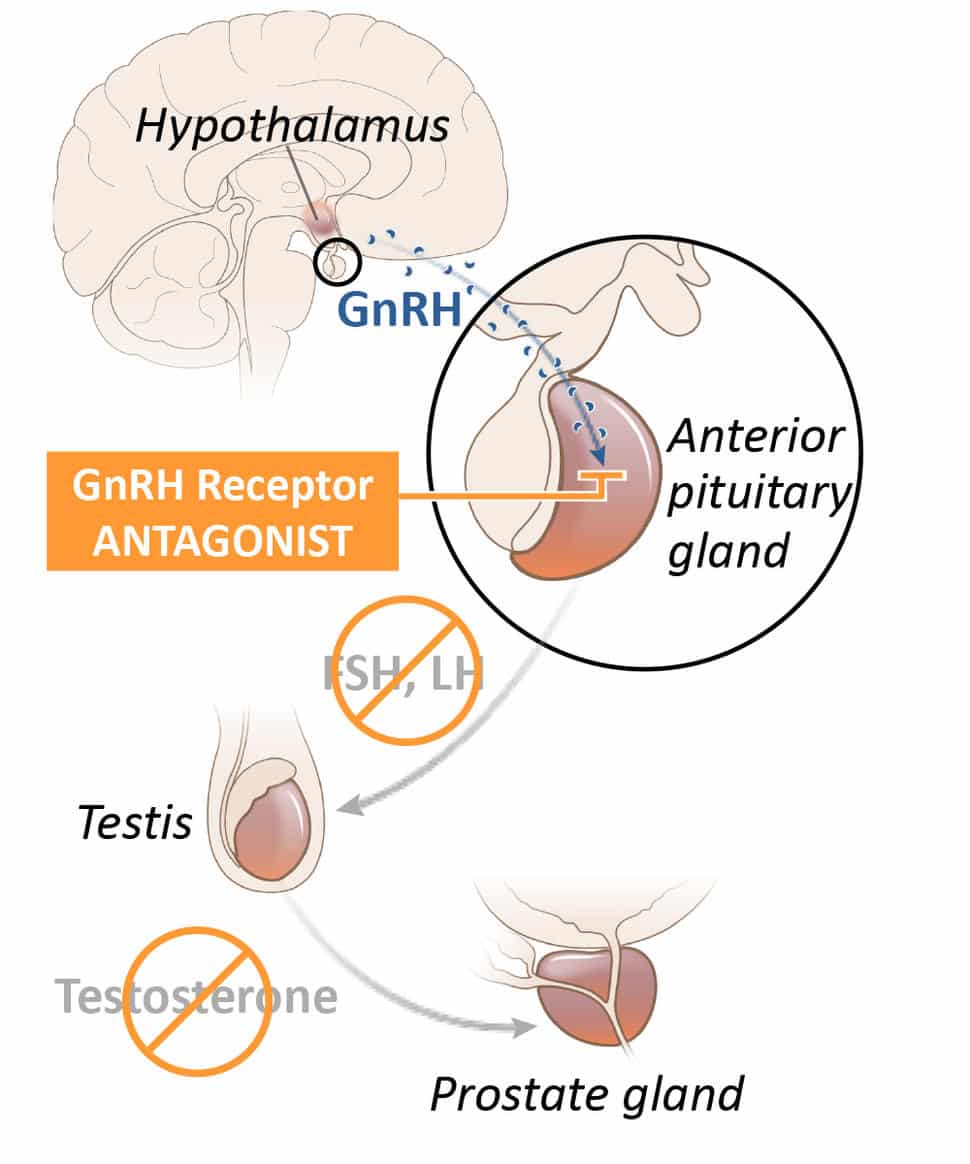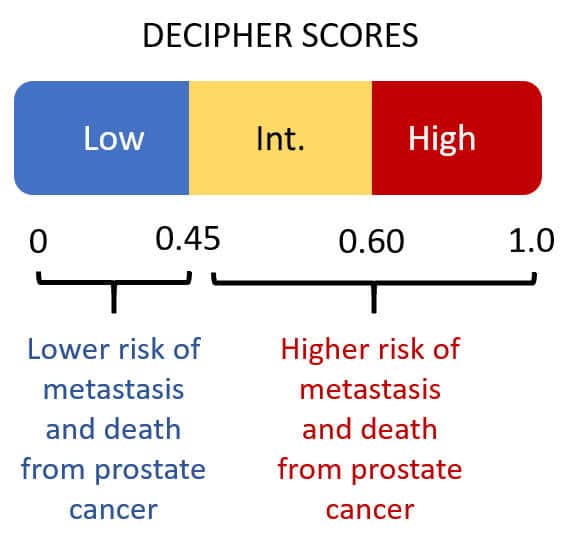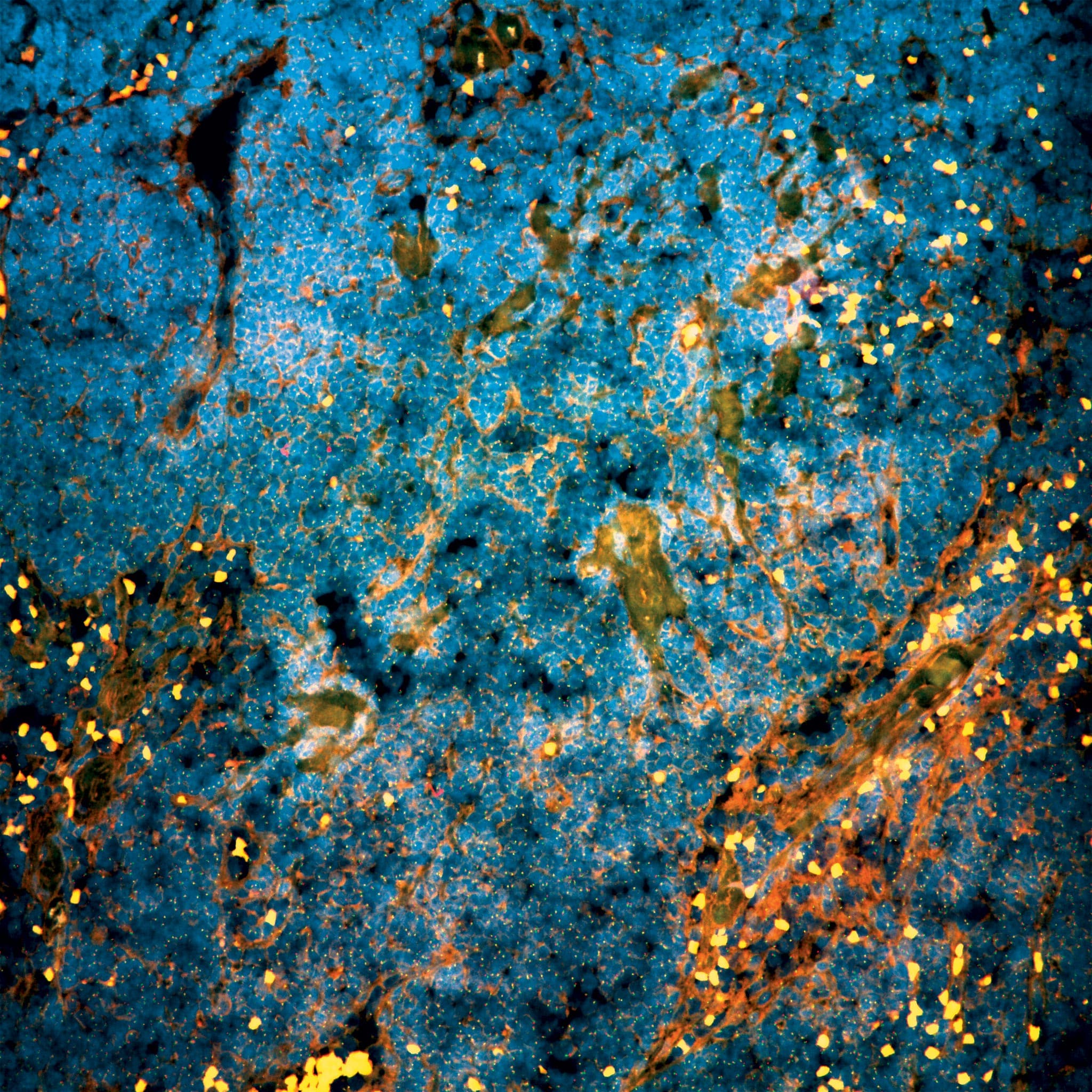Table : Survival Benefits Of Early Treatment
An analysis of 98 men with prostate cancer that had spread to the lymph nodes, who were randomly assigned to receive immediate hormone therapy or to forgo it until the disease spread further to bones or lungs, found that early treatment saved lives.
Deaths from prostate cancer 21 Source: Lancet Oncology 2006 7:4729. PMID: 16750497.
Other studies have shown that starting hormone therapy early on increases survival times, delays cancer progression, and results in better quality of life. However, in a review of four studies involving 2,167 men with metastatic prostate cancer, the Cochrane Collaboration concluded that early hormone therapy had offered only a small overall survival advantage over deferred treatment, and cautioned that more research on the issue needs to be done.
Although debate on this issue continues, in most cases I advise my patients with metastatic disease to begin hormone treatment early on. This is particularly important for someone with spine metastases, because a bone fracture or extension of the cancer into the spinal cord area could lead to impaired mobility and even paralysis. Fortunately, this is a rare event.
How Long Do You Take Hormonal Therapy For
For early prostate cancer this depends on the prostate cancer risk group. If the cancer is:
- intermediate-risk you may have hormonal therapy for a few months after radiotherapy
- high-risk you may be advised to have hormonal therapy for up to 2 to 3 years after radiotherapy.
For locally advanced prostate cancer you usually have hormonal therapy for 2 to 3 years after radiotherapy.
How Effective Is Hormone Therapy For Prostate Cancer
In the initial years of diagnosis, hormone therapy for prostate cancer can help patients with their symptoms and add years to their lives.
For men who need hormone therapy, such as men whose prostate-specific antigen levels are rising after surgery or radiation or men with advanced prostate cancer who dont yet have symptoms, its not always clear when the best time is to start hormone treatment:
- Some doctors think that hormone therapy works better if its started as soon as possible, even if the patient feels well and is not exhibiting any symptoms. Studies have shown that hormone treatment may slow down the disease and perhaps even help men live longer.
- Some doctors, however, donât agree with this approach. Because of the side effects and the risk of the cancer becoming resistant to therapy sooner, some doctors feel that treatment should not be started until cancer symptoms appear.
Recommended Reading: Testing Hormone Levels For Perimenopause
Checking Your Hormone Therapy Is Working
You have regular blood tests to check the level of a protein called prostate specific antigen . PSA is a protein made by both normal and cancerous prostate cells. It is in the blood in small amounts in all men, unless you have had the prostate gland completely removed.
While the hormone therapy is working, the level of PSA should stay stable or may go down. But if prostate cancer starts to grow and develop, the level of PSA may go up. This is hormone resistant prostate cancer or castrate resistant prostate cancer. Then your doctor may need to change your treatment. They will discuss this with you
Donât Miss: What Doctor Does Prostate Exams
What Is Hormone Therapy

Hormones occur naturally in your body. They control the growth and activity of normal cells. Testosterone is a male hormone mainly made by the testicles.
Prostate cancer usually depends on testosterone to grow. Hormone therapy blocks or lowers the amount of testosterone in the body.
Hormone therapy on its own doesnt cure prostate cancer. But it can lower the risk of an early prostate cancer coming back when you have it with other treatments. Or it can shrink an advanced prostate cancer or slow its growth.
You May Like: Will Low Estrogen Cause Hair Loss
Neoadjuvant And Adjuvant Hormone Therapy For Early
Hormone therapy is sometimes given in conjunction with a definitive prostate cancer treatment, such as radiation therapy, in order to improve health outcomes. When hormone therapy is given in advance of a primary treatment, its known as neoadjuvant therapy when its given during or after a primary treatment, its known as adjuvant therapy.
What Kinds Of Medicines Can Be Used To Lower My Testosterone
There are several types of medicines you can take to lower the amount of testosterone in your body. These are temporary ways to lower the amount of testosterone. When you stop taking these medicines, your testosterone level will begin to go up.
LHRH agonist
LHRH is a normal human hormone that tells your body to make testosterone. An LHRH agonist is a man-made hormone similar to the one made naturally in your body. LHRH agonists work like a light switch to shut off the production of testosterone in your body. When you are given this medicine, your body will stop making the LHRH hormone and your testicles will stop making testosterone. When you are first given this medicine, your body will continue to make testosterone for a couple of weeks. This means that your testosterone level may go up for a week or two and then begin to drop. This type of medicine works as well as having an orchiectomy . These medicines are given either monthly or every three months in a shot . The medicine may also be placed as small implants under your skin. The implant gives you a steady dose of medicine. Depending on the type of implant the medicine may last from one to 12 months.
Anti-androgens
Anti-androgens act like a brick wall. They block the small amount of testosterone made in your adrenal glands from reaching your prostate cancer cells. This keeps your prostate cancer cells from growing. These medicines are pills that are taken orally one to three times a day.
Read Also: How Much Melatonin Is Good For Sleep
Side Effects Of Androgen Deprivation Therapy
Since androgen deprivation treatment with LHRH analogues can also increase the risk of metabolic syndrome or diabetes mellitus, regular control of laboratory variables is required . Because of the two risks mentioned, the US Food and Drug Administration published a warning in 2010. This wasamong othersbased on a recommendation of the American Heart Association, the American Cancer Society, and the American Urological Association, and the support of the American Society for Radiation Oncology .
How Will I Know If My Treatment Is Working
You will have regular appointments to check how well your treatment is working and monitor any side effects. These will involve regular prostate specific antigen blood tests to measure the amount of PSA in your blood.
PSA is a protein produced by cells in your prostate and also by prostate cancer cells, even if they have spread to other parts of your body. The PSA test is a good way to check how well your treatment is working.
How your treatment is monitored will depend on whether youre having hormone therapy as part of treatment that aims to cure your prostate cancer, or having life-long hormone therapy to keep advanced prostate cancer under control.
You can contact your nurse at the hospital, or our Specialist Nurses, between appointments if you have any side effects or symptoms that youd like to talk about.
Don’t Miss: How To Measure Estrogen Levels
Hormone Therapy In Hormone
Hormone-sensitive cancer depends on hormones to grow. For those with early-stage prostate cancer thats at increased risk of spreading, hormone therapy may be given before, during or after radiation therapy or after surgery. It may also be used in men who have localized cancer and are unable to have other treatments.
For cancers that have recurred after radiation therapy or surgery, hormone therapy is the primary treatment. In patients with advanced prostate cancer, hormone therapy is usually combined with androgen deprivation therapy and sometimes chemotherapy.
How Hormone Therapy Works
Hormones are naturally occurring substances that stimulate the growth of hormone-sensitive tissues, such as the breast or prostate gland. Hormone therapy drugs deprive cancer cells of the hormones they need to grow.
Hormone therapy falls into two broad groups:
Hormone therapy can be administered in a few different ways:
-
For breast cancer, hormone therapy is usually administered through a pill or injection, typically for years following other cancer treatments.
-
For prostate cancer, hormone therapy often consists of injections every 3 to 6 months. Or, it may be placed as an implant under the skin, allowing the medication to slowly release over a longer period of time. Sometimes, a pill may be prescribed. Surgery to remove the testicles may also be recommended in order to reduce testosterone levels.
Your WVCI oncologist will determine the best method for your specific type of cancer.
Also Check: How To Get Your Testosterone Levels Checked
Treatment To Lower Testicular Androgen Levels
Androgen deprivation therapy, also called ADT, uses surgery or medicines to lower the levels of androgens made by the testicles.
Orchiectomy
Even though this is a type of surgery, its main effect is as a form of hormone therapy. In this operation, the surgeon removes the testicles, where most of the androgens are made. This causes most prostate cancers to stop growing or shrink for a time.
This is done as an outpatient procedure. It is probably the least expensive and simplest form of hormone therapy. But unlike some of the other treatments, it is permanent, and many men have trouble accepting the removal of their testicles. Because of this, they may choose treatment with drugs that lower hormone levels instead.
Some men having this surgery are concerned about how it will look afterward. If wanted, artificial testicles that look much like normal ones can be inserted into the scrotum.
LHRH agonists
Luteinizing hormone-releasing hormone agonists are drugs that lower the amount of testosterone made by the testicles. Treatment with these drugs is sometimes called medical castration because they lower androgen levels just as well as orchiectomy.
With these drugs, the testicles stay in place, but they will shrink over time, and they may even become too small to feel.
- Leuprolide mesylate
LHRH antagonists
Possible side effects
Many side effects of hormone therapy can be prevented or treated. For example:
Hormone Therapy For Prostate Cancer: What You Should Know

Your treatment team will determine whether you might benefit from hormone therapy based on factors such as the stage of disease and where its located on your prostate. Here are some details:
- What is hormone therapy for prostate cancer? Male hormones are called androgens. These hormones, such as testosterone, can aid the growth of prostate cancer cells. Hormone therapy uses man-made hormones or other medications to prevent cancer cells from getting or using the hormones they need to grow and spread.
- How we use hormone therapy for prostate cancer: Your care team will personalize your treatment recommendations to your specific circumstances. In general, your doctor may recommend using hormone therapy
- At the same time as radiation therapy, if doctors consider the cancer more aggressive or more likely to spread
- Before radiation therapy, to shrink the cancer
- If cancer comes back after a successful treatment
- If surgery or radiation are not recommended
Don’t Miss: Hormone Therapy And Radiation After Prostatectomy
Hormone Therapy Can Cause Side Effects
Because hormone therapy blocks your bodys ability to produce hormones or interferes with how hormones behave, it can cause unwanted side effects. The side effects you have will depend on the type of hormone therapy you receive and how your body responds to it. People respond differently to the same treatment, so not everyone gets the same side effects. Some side effects also differ if you are a man or a woman.
Some common side effects for men who receive hormone therapy for prostate cancer include
Use Of Hormone Therapy In Treating Prostate Cancer
Hormone therapy is used in several ways, and androgen deprivation in prostate cancer may be given using either medication or surgery. This prostate cancer treatment may be used to:
- Cause the testicles to produce less androgen
- Block androgens from doing their job throughout the body
- Block the body from producing androgens
Hormone therapy is often used for different stages of prostate cancer, including in men with low, intermediate and high risk of cancer growth and spread. This treatment is generally used:
- In cancers that have spread too extensively to be treated with radiation therapy or surgery
- In patients with pre-existing health conditions that prevent them from undergoing surgery or radiation therapy
- In cancers that recur after initial treatment or that werent completely removed by surgery or radiation therapy
- To help reduce a tumors size to make it easier to remove surgically
- For patients with a high risk of cancer recurrence
Recommended Reading: How To Balance Androgen Hormone
What The Researchers Did
Dr. Crawfords team reviewed clinical data from nearly 23,000 men who were given ADT injections between 2007 and 2016. Each mans treatment varied by how their ADT was formulated. Some types of ADT are given once a month, and others are given at three-, four-, or six-month intervals. The researchers wanted to know how many men were late on their ADT treatments, and how that would affect the amounts of testosterone in their blood.
During this research, the investigators defined month in two ways: either as one lasting 28 days, which is how months were defined during the clinical trials that set dosing schedules for ADT, or as a calendar month lasting 31 days. ADT was deemed late if it was given after day 28 by the first definition or after day 32 by the second definition.
Drugs That Lower Androgen Levels
The most common treatment is to take drugs that lower the amount of androgens made by the testicles. They are called luteinizing hormone-releasing hormone analogs and anti-androgens . These drugs lower androgen levels just as well as surgery does. This type of treatment is sometimes called “chemical castration.”
Men who receive androgen deprivation therapy should have follow-up exams with the doctor prescribing the drugs:
- Within 3 to 6 months after starting therapy
- At least once a year, to monitor blood pressure and perform blood sugar and cholesterol tests
- To get PSA blood tests to monitor how well the therapy is working
LH-RH analogs are given as a shot anywhere from once a month to every 6 months. These drugs include:
LH-RH antagonists are another class of treatments, including degarelix and relugolix . They reduce androgen levels more quickly and have fewer side effects. LH-RH antagonists are used in men with advanced cancer.
Some doctors recommend stopping and restarting treatment . This approach appears to help reduce hormone therapy side effects. However, it is not clear if intermittent therapy works as well as continuous therapy. Some studies indicate that continuous therapy is more effective or that intermittent therapy should only be used for select types of prostate cancer.
Also Check: Does Low Estrogen Birth Control Cause Weight Gain
Surgically Removing The Prostate Gland
A radical prostatectomy is the surgical removal of your prostate gland. This treatment is an option for curing prostate cancer that has not spread beyond the prostate or has not spread very far.
Like any operation, this surgery carries some risks, such as urinary incontinence and erectile dysfunction.
In extremely rare cases, problems arising after surgery can be fatal.
Its possible that prostate cancer can come back again after treatment. Your doctor should be able to explain the risk of your cancer coming back after treatment, based on things like your PSA level and the stage of your cancer.
Studies have shown that radiotherapy after prostate removal surgery may increase the chances of a cure, although research is still being carried out into when it should be used after surgery.
You may want to ask your doctors about storing a sperm sample before the operation so it can be used later for in vitro fertilisation .
Secondary Treatment Following Relapse
Hormone therapy may also be used as a secondary or salvage treatment when PSA levels rise following initial prostate cancer treatment, indicating the cancer has returned. This situation is known as biochemical recurrence. The salient points to keep in mind are that hormone therapy is most often used as a salvage treatment when PSA doubling time is less than six months, indicating that the cancer is aggressive or may have already metastasized.
Also Check: How Much Melatonin To Fall Asleep
How Testosterone Helps Prostate Cancer Grow
Testosterone travels through the bloodstream and eventually reaches prostate cancer cells, where it helps the cancer grow. Up to a point, the more testosterone the cancer cells have, the more the cancer can grow and eventually spread to other parts of the body. Hormone therapy is designed to prevent testosterone from fueling the growth of these cancer cells.
Cancers Treated With Hormone Therapy

Hormone therapy is used to treat prostate and breast cancers that use hormones to grow. Hormone therapy is most often used along with other cancer treatments. The types of treatment that you need depend on the type of cancer, if it has spread and how far, if it uses hormones to grow, and if you have other health problems.
Read Also: Liletta Iud Hormonal Side Effects